Entry-Level Agricultural Technician Position
Subject: Application for Agricultural Technician Position
Dear Hiring Manager,
I am writing to express my strong interest in the Agricultural Technician position at your farm. As a recent graduate with a degree in Agricultural Science from State University, I am eager to apply my academic knowledge and hands-on experience to contribute to your operation's success.
During my studies, I completed extensive coursework in soil science, crop management, and sustainable farming practices. My internship at Green Valley Farms provided me with practical experience in operating irrigation systems, conducting soil tests, and monitoring crop health. I assisted in implementing an integrated pest management program that reduced chemical usage by 30% while maintaining yield quality.
I am particularly drawn to your farm's commitment to sustainable agriculture and innovation in precision farming technologies. My senior capstone project focused on using drone technology for crop monitoring, and I am excited about the possibility of bringing these skills to your team.
I am a quick learner, physically fit, and comfortable working in all weather conditions. My strong work ethic and attention to detail make me well-suited for the demands of agricultural work. I am available to start immediately and am willing to work flexible hours during peak seasons.
Thank you for considering my application. I have attached my resume and would welcome the opportunity to discuss how my education and enthusiasm can benefit your operation.
Sincerely,
[Your Name]
Experienced Farm Manager Position
Subject: Application for Farm Manager Position - 12 Years Experience
Dear [Hiring Manager's Name],
I am writing to apply for the Farm Manager position advertised on your website. With over 12 years of comprehensive experience managing large-scale agricultural operations, I am confident in my ability to lead your farm to increased productivity and profitability.
In my current role as Operations Manager at Riverside Farms, I oversee 500 acres of mixed crop production and manage a team of 15 employees. Under my leadership, we have achieved a 25% increase in yield efficiency while reducing operational costs by 18% through strategic resource allocation and implementation of modern farming techniques.
My expertise includes crop rotation planning, budget management, equipment maintenance oversight, and regulatory compliance. I have successfully navigated complex challenges including drought management, market fluctuations, and labor shortages while maintaining consistent production quality. I hold certifications in pesticide application, food safety protocols, and farm business management.
I am particularly impressed by your farm's expansion plans and commitment to sustainable practices. My experience with organic certification processes and water conservation systems would be valuable assets as you grow. I have a proven track record of building strong teams, fostering safety culture, and maintaining positive relationships with suppliers and distributors.
I would appreciate the opportunity to discuss how my leadership experience and technical knowledge can contribute to your farm's continued success. My references can attest to my problem-solving abilities and dedication to agricultural excellence.
Thank you for your consideration.
Best regards,
[Your Name]
Aquaculture Technician Position
Subject: Application for Aquaculture Technician Role
Dear Hiring Committee,
I am excited to apply for the Aquaculture Technician position at your facility. My passion for marine biology combined with three years of hands-on experience in fish hatchery operations makes me an ideal candidate for this role.
At Coastal Aquafarms, I have been responsible for monitoring water quality parameters, feeding protocols, and disease prevention measures across multiple production tanks. I maintain detailed records of growth rates, mortality, and environmental conditions, which has helped optimize our production cycle and reduce losses by 15%. I am proficient in using oxygen meters, pH testers, and automated feeding systems.
My background includes experience with both freshwater and saltwater species, including tilapia, salmon, and shrimp. I understand the critical importance of biosecurity measures and have completed training in fish health management and HACCP protocols. I am comfortable performing routine maintenance on filtration systems, aerators, and temperature control equipment.
Your facility's reputation for innovation in recirculating aquaculture systems particularly interests me. I am eager to learn new technologies and contribute to efficient, sustainable seafood production. I work well independently and as part of a team, and I am available for weekend and holiday shifts as required.
I have attached my resume and certifications. I look forward to discussing how I can support your aquaculture operations.
Sincerely,
[Your Name]
Agricultural Research Position - Creative Approach
Subject: Ready to Dig Into Agricultural Innovation!
Dear Dr. [Name],
If plants could talk, I bet they'd have some fascinating feedback about current agricultural practices—and I want to help translate that feedback into actionable research! I'm writing to apply for the Agricultural Research Assistant position in your soil microbiology lab.
My journey into agricultural science started in my grandmother's garden and led me through a Master's degree in Agronomy, but the real education happened in the field—literally. I've spent the past two years investigating the relationship between mycorrhizal fungi and drought resistance in wheat varieties, and the results have been eye-opening. We discovered that certain fungal partnerships could improve water uptake efficiency by up to 40%, which could be game-changing for water-stressed regions.
What excites me about your research program is the interdisciplinary approach—combining soil science, plant pathology, and data analytics to solve real-world problems. I'm not just a lab coat enthusiast; I'm comfortable whether I'm pipetting samples in a controlled environment or knee-deep in a test plot collecting root samples in the rain. My statistical analysis skills (R and Python) complement my fieldwork abilities, and I believe this combination is exactly what modern agricultural research demands.
Your recent publication on carbon sequestration in agricultural soils stopped me in my tracks. I'd love to contribute to this critical work and bring my experience with long-term field trials and greenhouse experiments to your team.
Let's grow something amazing together. I'd be thrilled to discuss how my research background and genuine passion for sustainable agriculture align with your lab's mission.
Enthusiastically yours,
[Your Name]
Career Transition to Agriculture
Subject: Career Change Application - Bringing Business Skills to Agriculture
Dear [Hiring Manager's Name],
I am writing to express my interest in joining your agricultural enterprise, though my path to this moment may be unconventional. After ten years in corporate project management, I am making a deliberate career transition to agriculture—a field that aligns with my values and long-term goals.
While I acknowledge that my resume doesn't show traditional agricultural employment, my recent preparations demonstrate serious commitment. I have completed a Professional Certificate in Sustainable Agriculture, volunteered for six months at a local community farm, and purchased 20 acres where I've begun establishing a small operation. This hands-on experience has taught me the physical demands, seasonal challenges, and problem-solving requirements of agricultural work.
What I bring from my previous career is directly transferable: project management expertise, budget analysis, supply chain coordination, and team leadership. I understand how to prioritize tasks, meet deadlines under pressure, and adapt plans when circumstances change—skills that are essential in agriculture. My experience managing multi-million dollar projects has prepared me for the financial planning and risk management aspects of farm operations.
I am realistic about starting in a learning capacity despite my age and previous career level. I am prepared to work hard, take direction, and prove my dedication to this field. I am not seeking a desk job; I want to be actively involved in day-to-day operations while contributing my organizational and analytical skills where they add value.
I would appreciate the opportunity to discuss how my unique combination of business acumen and genuine agricultural interest could benefit your operation. I am available for a working interview where I can demonstrate my capability and work ethic.
Thank you for considering my unconventional application.
Respectfully,
[Your Name]
Seasonal Agricultural Worker Position - Informal
Subject: Interested in Harvest Season Work
Hi there,
I saw your posting for seasonal workers for the upcoming harvest and wanted to reach out. I'm available and ready to work hard!
I worked last season at Maple Ridge Orchard doing apple picking and packing, and I really enjoyed the work despite the early mornings and long days. My supervisor there can confirm that I was reliable, showed up on time every day, and consistently met picking quotas. I'm comfortable on ladders, can lift heavy loads, and don't mind repetitive tasks.
I'm physically fit, have my own transportation, and can commit to the full season from August through October. I'm also flexible with hours and willing to work weekends and overtime when needed. I understand this is demanding work, but I'm used to being on my feet all day and working outdoors.
I'm a fast learner and follow safety procedures carefully. I get along well with coworkers and supervisors, and I take pride in doing quality work even when the job is tough.
If you need someone dependable who will give 100% effort every day, I'm your person. I can start immediately and would love to be part of your harvest team.
Let me know if you'd like to meet or need any other information. Thanks for considering me!
Best,
[Your Name]
Aquaculture Farm Manager - Formal
Subject: Application for Aquaculture Operations Manager Position
Dear Members of the Selection Committee,
I respectfully submit my application for the Aquaculture Operations Manager position at your facility. With 15 years of progressive experience in aquaculture management and a Master's degree in Aquatic Sciences, I am well-prepared to lead your operations to new levels of productivity and sustainability.
My career encompasses comprehensive experience across all aspects of aquaculture production, from hatchery operations to harvest and processing coordination. As Operations Director at Pacific Aquafarms, I currently oversee 50 acres of production ponds and manage annual production of 500 metric tons of premium seafood products. My responsibilities include strategic planning, regulatory compliance, staff development, biosecurity implementation, and financial management.
I have successfully led major initiatives including the transition to recirculating aquaculture systems, which improved water use efficiency by 60% and reduced environmental impact. I implemented quality control protocols that achieved BAP (Best Aquaculture Practices) four-star certification, opening new market opportunities and increasing product value by 25%. My experience with disease management and crisis response has been crucial in maintaining production stability and minimizing losses.
Additionally, I have established strong relationships with regulatory agencies, research institutions, and industry partners. I have published peer-reviewed articles on sustainable aquaculture practices and regularly present at industry conferences. My commitment to professional development includes current certifications in aquatic animal health, food safety, and environmental management systems.
I am attracted to your organization's vision for sustainable seafood production and innovation in offshore aquaculture systems. I am confident that my technical expertise, leadership capabilities, and strategic thinking align well with your operational goals and expansion plans.
I would welcome the opportunity to discuss how my qualifications and experience can contribute to your organization's continued success and growth in the aquaculture industry.
Yours sincerely,
[Your Name]
Agricultural Internship Application - Enthusiastic
Subject: Summer Internship Application - Ready to Learn and Work Hard!
Dear [Coordinator's Name],
I am thrilled to apply for the summer internship program at your farm! As a sophomore majoring in Agricultural Business at State College, I am eager to gain real-world experience and learn from professionals who are passionate about sustainable food production.
Agriculture isn't just an academic interest for me—it's a calling. I grew up visiting my uncle's dairy farm, and those experiences sparked a lifelong fascination with where our food comes from. Now I'm ready to move beyond textbooks and get my hands dirty (literally!) while learning the practical realities of farm operations.
I understand that internships are learning opportunities, and I'm prepared to start with basic tasks and work my way up. Whether it's weeding, fence repair, animal care, or data collection, I'm ready to contribute however I can be most helpful. I'm not afraid of early mornings, physical work, or challenging conditions—I actually find that kind of work incredibly satisfying.
What I hope to gain from this experience is comprehensive exposure to daily farm operations, business management practices, and decision-making processes. I want to understand how farms balance production goals with sustainability, how they manage labor and resources, and how they adapt to market changes and weather challenges.
I'm a quick learner, reliable, and genuinely enthusiastic about agriculture. I have basic knowledge of crop science, animal husbandry, and farm equipment, but I know there's so much more to learn from hands-on experience. I promise to be the most dedicated, hardworking, and positive intern you've ever had!
Thank you for considering my application. I would love the chance to contribute to your operation while learning invaluable lessons that will shape my agricultural career.
Excitedly,
[Your Name]
What Are Cover Letters for Jobs in Agriculture and Aquaculture and Why Do You Need Them
- A cover letter is a personalized document that accompanies your resume when applying for positions in farming, aquaculture, agribusiness, research, or related agricultural fields
- It serves as your introduction to potential employers and explains why you're interested in the specific position and what unique value you bring
- Unlike your resume which lists facts, the cover letter tells your professional story and demonstrates your communication skills, passion for agriculture, and understanding of the industry
- In agriculture and aquaculture specifically, employers want to see genuine commitment to the field, physical capability, and understanding of the unique challenges of working with living organisms and natural systems
- A well-crafted cover letter can distinguish you from other candidates who may have similar technical qualifications but haven't demonstrated personal connection to agricultural work
- It provides context for career gaps, transitions, or unconventional backgrounds that might otherwise raise questions
- For specialized positions in research, management, or technical roles, the cover letter demonstrates your knowledge of industry trends, sustainability practices, and emerging technologies
Who Should Send These Cover Letters
- Recent graduates with degrees in agriculture, animal science, aquaculture, agribusiness, or related fields seeking entry-level positions
- Experienced agricultural professionals applying for management, supervisory, or specialized technical roles
- Career changers transitioning from other industries into agriculture or aquaculture
- Students seeking internships, apprenticeships, or seasonal positions to gain practical experience
- Seasonal workers looking for harvest, planting, or temporary positions
- Agricultural researchers and scientists applying for laboratory, field research, or academic positions
- Aquaculture technicians and specialists with experience in hatcheries, fish farms, or marine operations
- Farm managers and operations directors seeking advancement opportunities
- Anyone with relevant skills (mechanics, business management, veterinary science) pivoting into agricultural applications
When Should You Send Cover Letters for Agricultural Positions
- Immediately upon discovering a job posting that matches your qualifications and interests (many agricultural positions fill quickly, especially seasonal roles)
- 2-3 months before harvest season for seasonal picking, packing, or processing positions
- During traditional hiring periods for your target sector (spring for growing season positions, fall for post-harvest roles, year-round for aquaculture and livestock operations)
- When career fairs or agricultural job expos provide networking opportunities with employers
- After informational interviews or farm visits when expressing interest in future opportunities
- When transitioning from academic programs—final semester of degree completion or certificate programs
- Following internships or temporary positions when seeking permanent employment with the same organization
- When industry contacts inform you of upcoming openings before public announcement
- During facility expansions or new operations launches announced in agricultural trade publications
Elements and Structure Your Agricultural Cover Letter Must Include
- Contact Information: Your name, phone, email, and location (city/state) at the top
- Date and Employer Details: Current date and recipient's name, title, organization, and address when known
- Subject Line: Clear position title you're applying for (critical for digital applications)
- Opening Paragraph: State the position, how you learned about it, and immediate hook showing enthusiasm or connection
- Qualification Body Paragraphs: 2-3 paragraphs demonstrating relevant experience, education, skills, and achievements with specific examples and quantifiable results when possible
- Knowledge of Employer: Show you've researched the farm/facility and explain why you're specifically interested in their operation
- Physical Capability Statement: For field positions, acknowledge understanding of physical demands and your ability to meet them
- Availability and Commitment: Clearly state when you can start, schedule flexibility, and duration of commitment (especially for seasonal roles)
- Call to Action: Request interview or meeting and express willingness to demonstrate skills through working interview
- Professional Closing: "Sincerely," "Best regards," or similar formal closing with your name
- Mention of Attachments: Note that resume, certifications, or references are included
How to Write an Effective Cover Letter for Agricultural Jobs
- Research thoroughly: Learn about the farm's crops, livestock, aquaculture species, production methods, certifications (organic, GAP, BAP), size, and reputation before writing
- Match tone to position: Use professional formal language for management and research roles, but slightly more casual and enthusiastic tone is acceptable for entry-level and seasonal positions
- Lead with relevant experience: Put your most applicable qualifications in the first body paragraph—don't bury your agricultural credentials
- Quantify achievements: Use numbers and percentages (increased yield by 20%, managed 500 acres, reduced costs by $15K, supervised 12 employees)
- Address potential concerns proactively: If you lack direct experience, emphasize transferable skills, recent training, or volunteer work
- Show industry knowledge: Reference current agricultural challenges, technologies, or sustainability practices relevant to the position
- Demonstrate cultural fit: Mention values like stewardship, hard work, quality, innovation, or sustainability if they align with the employer's mission
- Be honest about expectations: Agricultural work involves irregular hours, physical labor, and exposure to elements—show you understand and accept this
- Customize each letter: Never send generic cover letters; tailor every application to the specific position and employer
- Proofread meticulously: Errors suggest lack of attention to detail, which is critical in agriculture where precision matters
Formatting Guidelines for Agriculture and Aquaculture Cover Letters
- Length: Keep to one page (300-400 words maximum); agricultural employers value conciseness and respect for their time
- Format: Use standard business letter format with single spacing, one-inch margins, and professional 11-12 point font (Arial, Calibri, Times New Roman)
- Digital delivery: Most applications are now via email or online portals; save as PDF to preserve formatting unless otherwise specified
- File naming: Use clear names like "YourName_CoverLetter_PositionTitle.pdf" rather than generic "cover letter.pdf"
- Paragraphs: Use 3-5 short paragraphs rather than dense blocks of text for easy scanning
- Tone variation by role: Management positions require formal professional tone; field positions allow slightly more personality and enthusiasm; research positions should emphasize technical competence and academic rigor
- Avoid excessive design: Unlike creative industries, agriculture values substance over style—stick to clean, simple formatting without graphics or unusual fonts
- Mobile-friendly: Many farm managers review applications on phones; ensure your letter is readable on small screens
- Attachments: When emailing, include cover letter in body of email AND as attachment with resume
Common Mistakes to Avoid in Agricultural Job Applications
- Generic letters: Sending identical letters to multiple farms without customization shows lack of genuine interest
- Overemphasis on education without practical experience: Agricultural employers value hands-on skills; don't rely solely on academic credentials
- Ignoring physical requirements: Failing to acknowledge you understand the demanding nature of agricultural work raises red flags
- Unrealistic salary expectations: Entry-level agricultural positions often pay less than other industries; showing flexibility demonstrates commitment
- Missing seasonal timing: Applying for harvest positions in July when hiring happened in May shows poor planning
- Excessive focus on personal goals: While mentioning career aspirations is fine, emphasize what you offer the employer, not just what you hope to gain
- Neglecting safety and regulatory awareness: Not mentioning understanding of safety protocols, food safety, or environmental regulations suggests inexperience
- Poor grammar and spelling: Even for labor positions, communication skills matter; errors suggest carelessness
- Vague statements: Saying "I'm a hard worker" without examples is meaningless; provide specific instances demonstrating work ethic
- Omitting availability details: Agricultural operations need to know your schedule flexibility and commitment length upfront
- Forgetting to mention transportation: Many farms are in rural areas; confirm you have reliable transportation if location requires it
Tips and Best Practices for Agricultural Cover Letters
- Use industry terminology correctly: Demonstrate familiarity with agricultural language but avoid excessive jargon that might seem pretentious
- Mention certifications prominently: Pesticide applicator licenses, food safety certifications, equipment operation credentials, or organic handling certificates
- Include relevant volunteer experience: 4-H, FFA, community gardens, or agricultural non-profit work demonstrates genuine connection to farming
- Address geographic ties: If you're from a rural area or farming family, mention it—cultural fit matters in tight-knit agricultural communities
- Show problem-solving examples: Agriculture involves constant troubleshooting; demonstrate analytical thinking and adaptability
- Express willingness to learn: Even experienced professionals should show openness to new methods, technologies, and approaches
- Reference specific challenges: Mention understanding of issues like labor shortages, climate variability, market fluctuations, or disease management
- Highlight complementary skills: Computer literacy, mechanical aptitude, foreign languages, or business skills that enhance agricultural capabilities
- Follow instructions precisely: If posting requests specific information or format, comply exactly—attention to detail matters
- Connect sustainability values: Most modern agricultural operations prioritize environmental stewardship; align your values with theirs authentically
- Consider a working interview offer: Volunteering for a trial day shows confidence and genuine interest while letting both parties assess fit
After Sending Your Application: Follow-Up Strategy
- Wait 5-7 business days before initial follow-up unless posting specified different timeline
- Send brief follow-up email confirming receipt of application and reiterating interest—keep it to 3-4 sentences maximum
- Call for urgent seasonal positions if appropriate—many farmers prefer phone contact and may not check email regularly
- Be persistent but respectful: One follow-up email and possibly one phone call is appropriate; more becomes pushy
- Keep application materials ready: Farmers might call unexpectedly for immediate interview; have resume and notes accessible
- Research continues: Stay current on agricultural news and employer's recent activities in case you're contacted for interview
- Prepare references: Notify your references that they might be contacted and brief them on the position
- Stay engaged: If you've connected with the employer at job fair or farm visit, brief thank-you note or connection on LinkedIn maintains visibility
- Don't wait exclusively: Continue applying to other positions; agricultural hiring can be unpredictable
- Request feedback if rejected: Politely ask what you could improve for future applications; agricultural community appreciates professionalism
- Maintain relationship: Even if not selected, express appreciation and interest in future opportunities—farming is a small world
Requirements and Prerequisites Before Applying
- Valid work authorization: Confirm you're legally eligible to work in the country/region where the position is located
- Physical capability: Honestly assess whether you can meet the physical demands—many positions require lifting 50+ pounds, standing for extended periods, or working in extreme weather
- Reliable transportation: Most agricultural operations are in rural areas without public transit; confirm you can commute reliably
- Necessary licenses and certifications: Obtain driver's license, pesticide applicator permit, food handler's certificate, or equipment operation credentials before applying if required
- Educational requirements: Complete degree, diploma, or certificate programs if position specifies educational prerequisites
- Background checks: Be prepared for background screening, especially for positions involving access to high-value equipment or sensitive operations
- Drug testing: Many agricultural employers require pre-employment drug screening; be prepared to comply
- Updated resume: Have current resume highlighting relevant agricultural experience, education, and skills
- Reference list: Prepare 3-4 professional references who can speak to your work ethic, reliability, and relevant skills
- Portfolio or work samples: For research positions, bring publications or project summaries; for management roles, prepare examples of plans or reports you've created
- Basic safety training: OSHA training, first aid certification, or tractor safety courses strengthen applications
Advantages and Disadvantages of Formal Cover Letters in Agriculture
Advantages:
- Demonstrates professionalism and communication skills that are valuable even in hands-on roles
- Provides opportunity to explain unique circumstances, career transitions, or gaps that resume alone cannot address
- Shows genuine interest and effort beyond simply submitting resume
- Allows you to highlight specific qualifications most relevant to particular position
- Creates personal connection and helps employer remember you among many applicants
- Demonstrates cultural fit and shared values with employer's operation
- Gives context for why you're interested in specific farm or aquaculture facility
Disadvantages:
- Time-consuming to customize for each application, especially when applying to multiple seasonal positions
- Some small-scale farmers prefer phone calls or in-person applications over formal written materials
- Risk of errors or poor writing actually hurting your chances if not well-executed
- May seem overly formal for simple labor positions where work ethic matters more than writing ability
- Can delay application submission if you spend too much time perfecting the letter
- Some employers don't read cover letters, making effort feel wasted
- May create expectations of communication skills that don't match actual job requirements
Comparing Cover Letters with Alternative Application Methods
Cover Letter vs. Phone Call:
- Phone calls work better for small family farms and urgent seasonal hiring
- Cover letters provide written record and allow employer to review at convenience
- Phone demonstrates initiative and personal connection but requires good timing
- Letters allow you to carefully craft message without pressure of real-time conversation
Cover Letter vs. In-Person Application:
- Direct farm visits show proactive attitude and allow immediate assessment of cultural fit
- Cover letters are more practical for distant positions or large corporate agricultural operations
- In-person visits demonstrate commitment but may be inconvenient for busy farmers
- Letters allow you to reach multiple employers efficiently
Cover Letter vs. LinkedIn/Professional Network Message:
- LinkedIn appropriate for professional agricultural roles and research positions
- Cover letters remain standard for formal applications through job boards or company websites
- Network messages work for initial contact but should be followed by formal application
- Social media connections supplement but don't replace traditional application materials
Cover Letter vs. Video Introduction:
- Video applications rare in agriculture but could differentiate you for innovative operations
- Traditional letters still preferred by most conventional agricultural employers
- Videos show personality but require production quality and may seem gimmicky
- Stick with letter unless specifically requested or applying to tech-forward agribusiness
To Whom Should Agricultural Cover Letters Be Addressed
- Farm owner or operator: For small to medium family farms, address directly to owner whose name appears on website or posting
- Hiring manager or HR director: Larger agricultural corporations and processing facilities typically have dedicated recruitment staff
- Operations manager or production manager: For technical positions in specific departments (hatchery, greenhouse, livestock division)
- Research director or principal investigator: For positions in agricultural research institutions, universities, or corporate R&D departments
- "Hiring Committee" or "Selection Committee": When position posting indicates multiple decision-makers review applications
- Department head: For specialized roles within large agricultural organizations (head of aquaculture, chief agronomist)
- Generic "Dear Hiring Manager": Acceptable only when you cannot determine specific recipient after thorough research
- Avoid "To Whom It May Concern": This phrase feels outdated and impersonal; "Dear Hiring Manager" is preferable
- Include title and full name when known: "Dear Dr. Martinez," "Dear Mr. Thompson," showing you've done research
- Call to verify recipient: If posting is vague, brief phone call to confirm appropriate recipient shows initiative and ensures letter reaches right person
Frequently Asked Questions About Agricultural Job Cover Letters
Should I mention salary expectations in my cover letter? No, unless specifically requested in job posting. Salary discussions belong in interview phase. However, confirming flexibility regarding entry-level pay is appropriate for career changers.
How do I address lack of direct agricultural experience? Focus on transferable skills (leadership, problem-solving, physical stamina), recent training or education, volunteer work, and genuine enthusiasm. Emphasize willingness to learn and start in entry positions.
Is it appropriate to mention family farming background? Absolutely—this demonstrates cultural understanding and genuine connection to agricultural lifestyle. Briefly mention family farm experience as context for your interest and work ethic.
Should I explain why I'm leaving my current agricultural job? Only if departure reason strengthens your application (seeking growth opportunities, relocating, specialization interest). Never criticize current employer. Focus on what attracts you to new position.
Do aquaculture positions require different cover letter approach? Emphasize technical knowledge of water quality, species-specific requirements, biosecurity, and environmental monitoring. Highlight any marine biology or aquatic science education.
How do I stand out when applying for seasonal positions with many applicants? Emphasize reliability, previous seasonal work completion, physical capability, and flexibility. Offering references from previous seasonal employers is powerful.
Should I mention I'm willing to relocate? Yes, especially for management or specialized positions in rural areas. Confirming relocation flexibility removes potential concern about commitment and geographic fit.
Can I use the same cover letter for similar positions? No—customize each letter with specific farm name, crops/species, and relevant details. However, you can maintain a template structure and swap specific details efficiently.
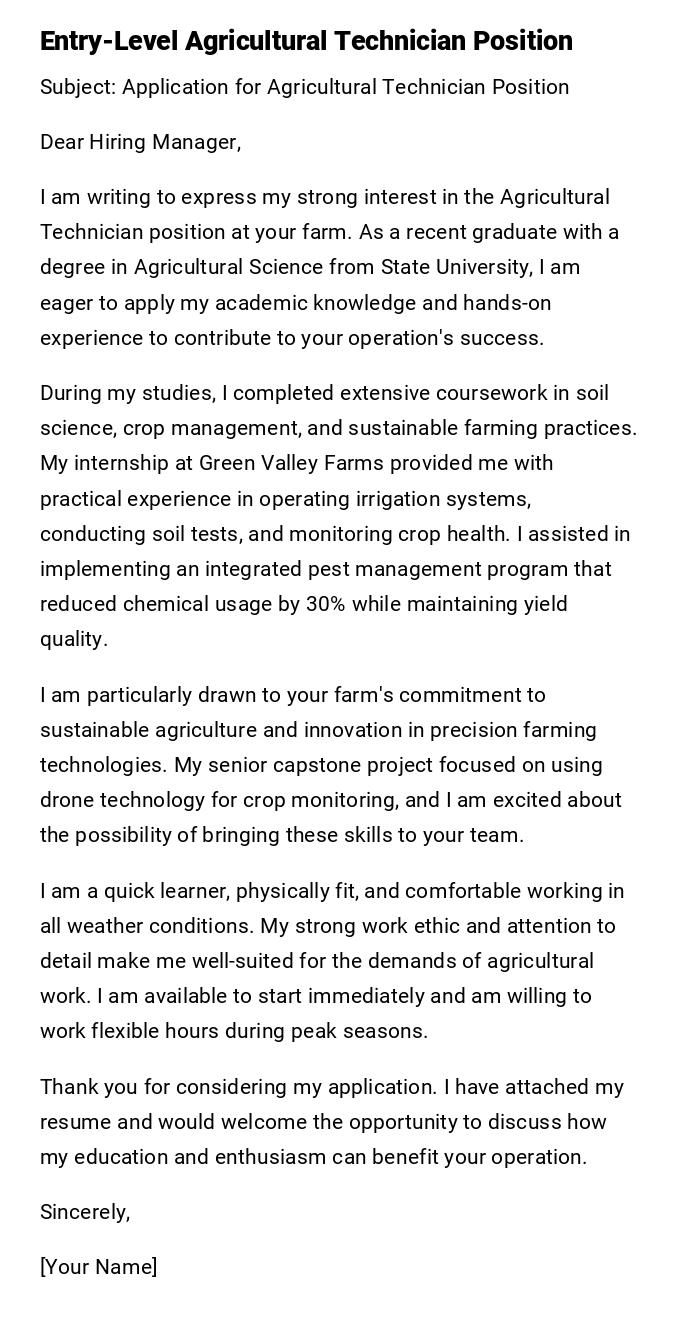
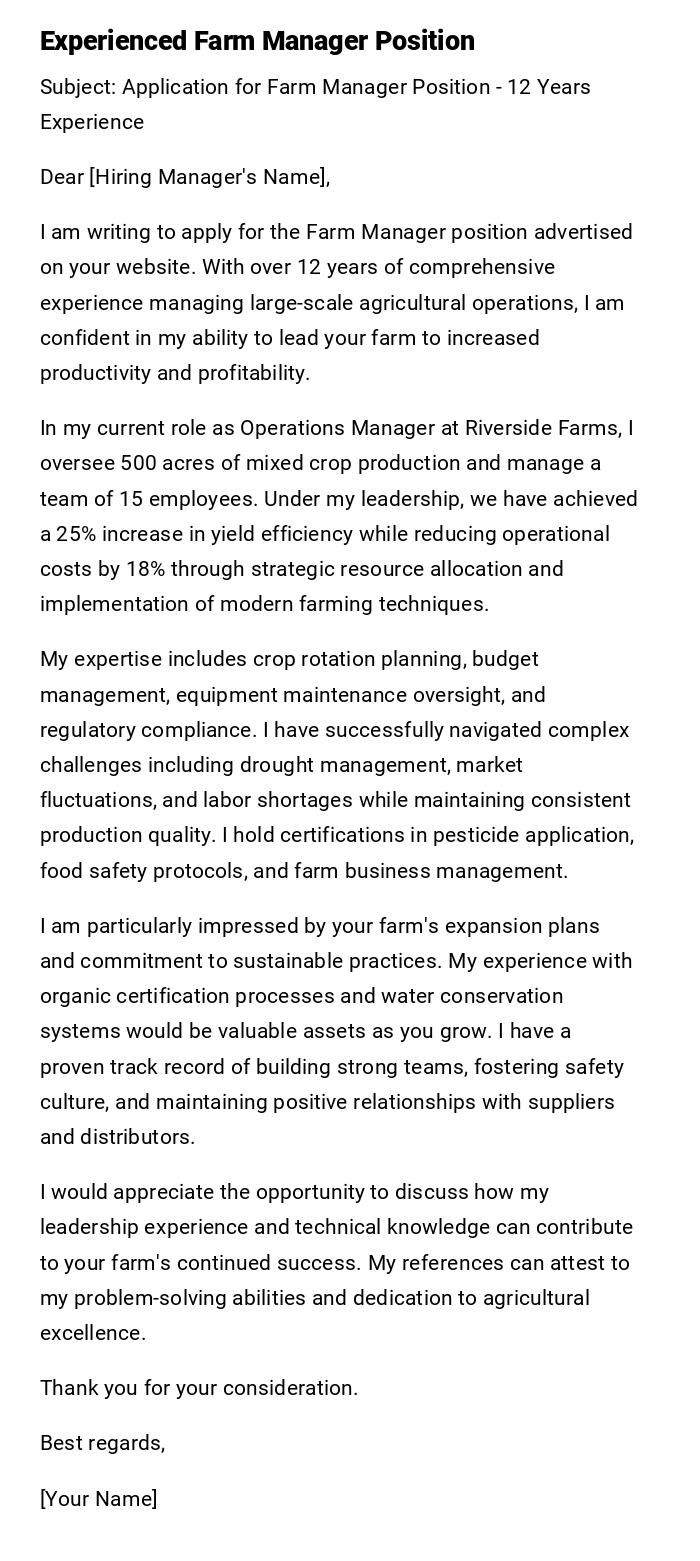
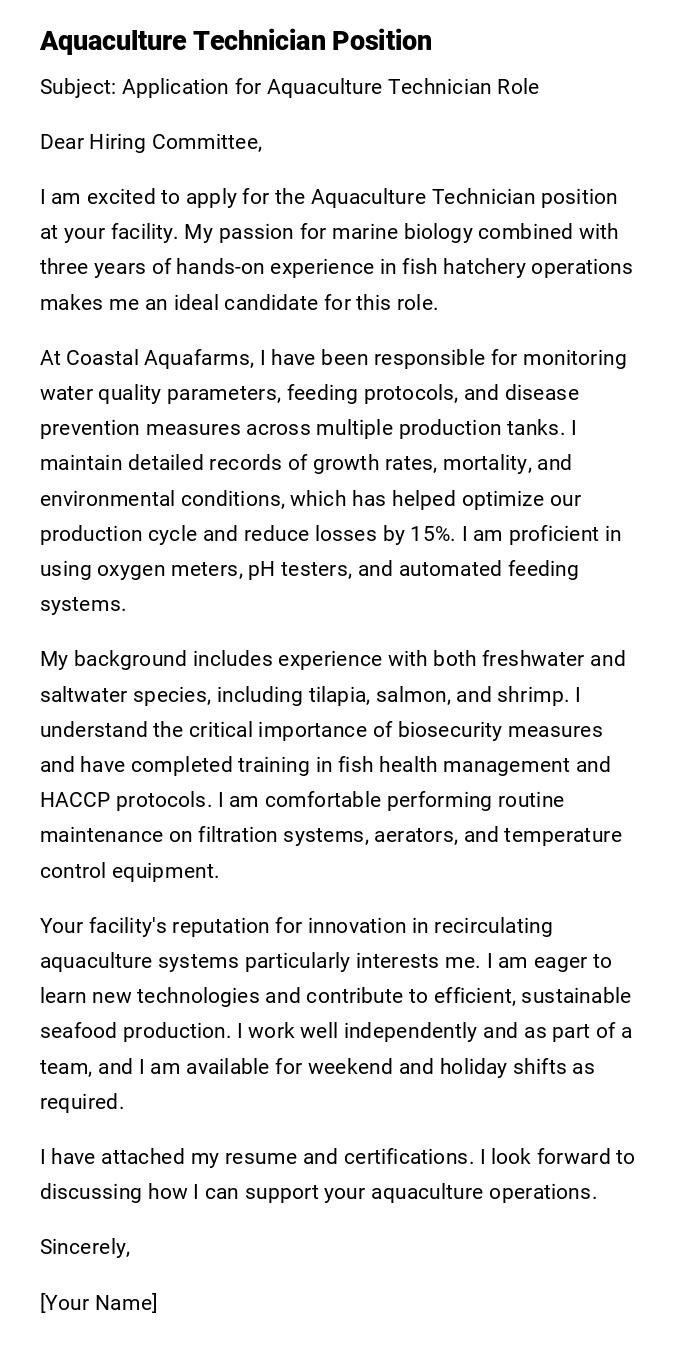
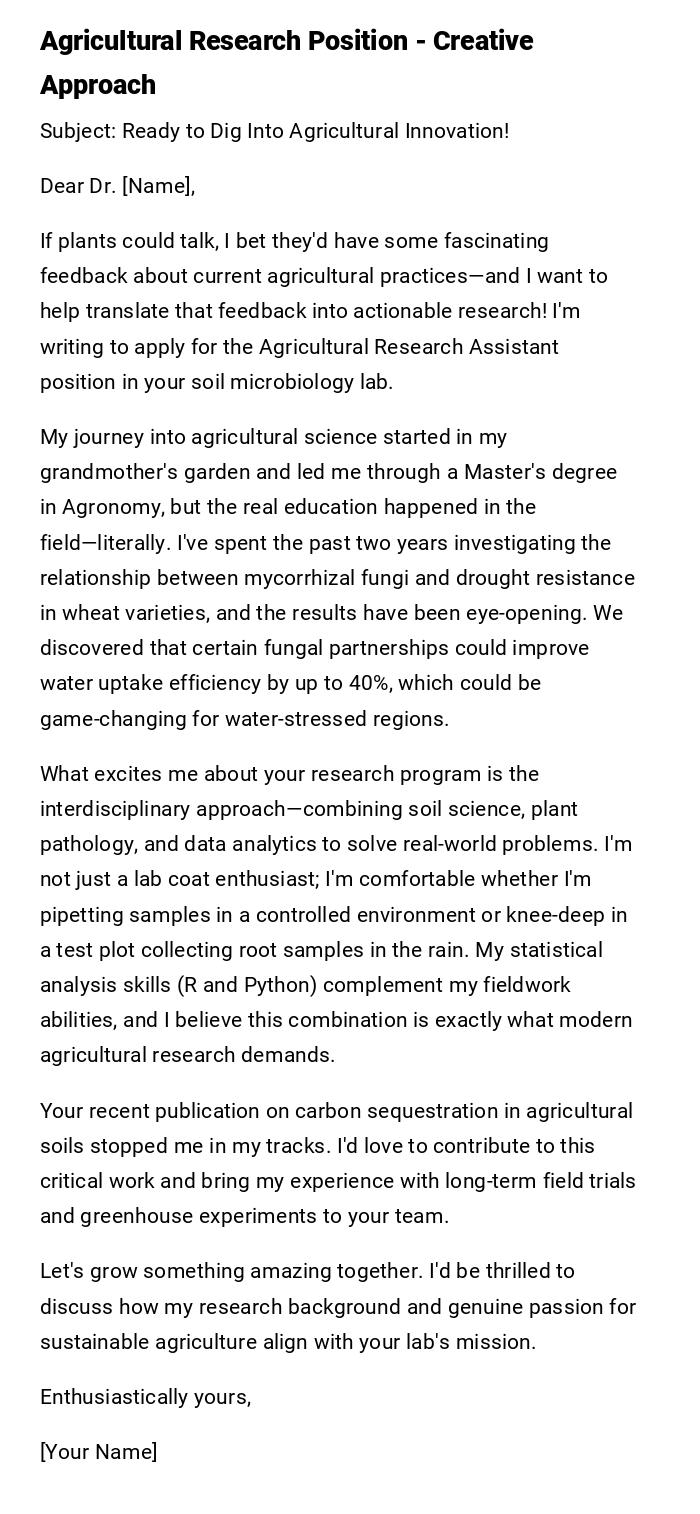
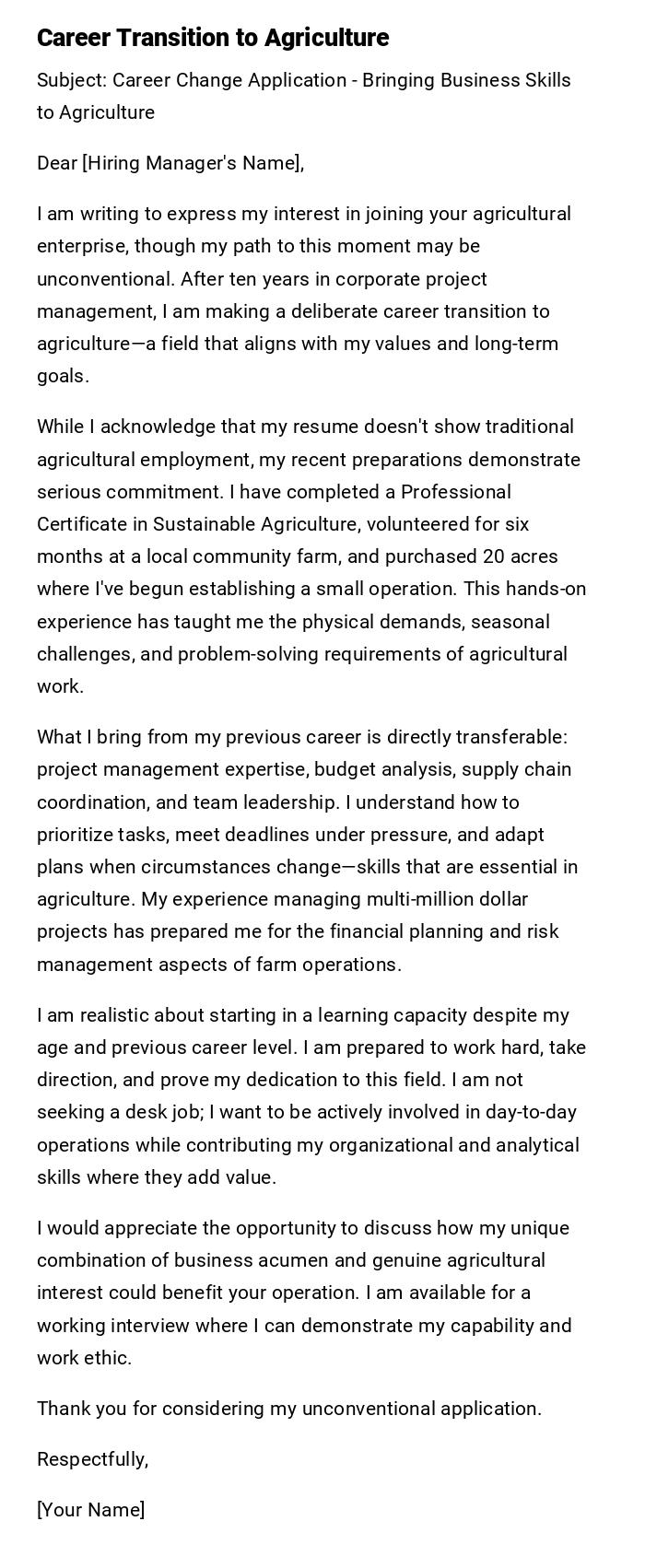
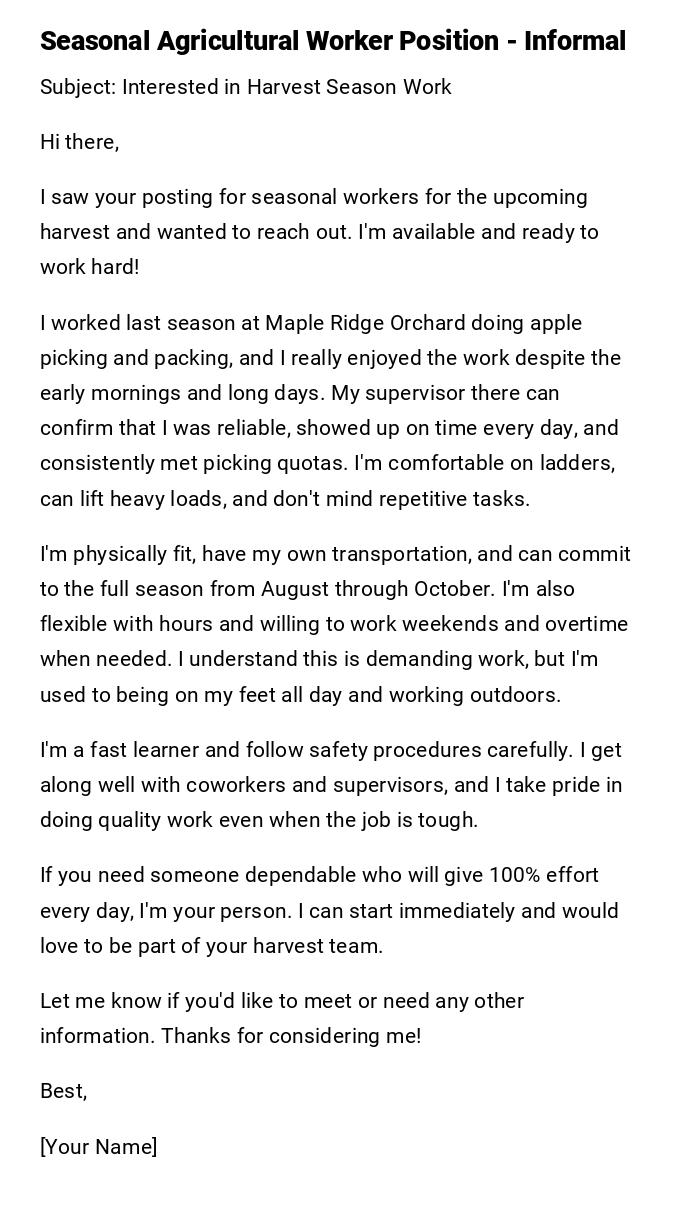
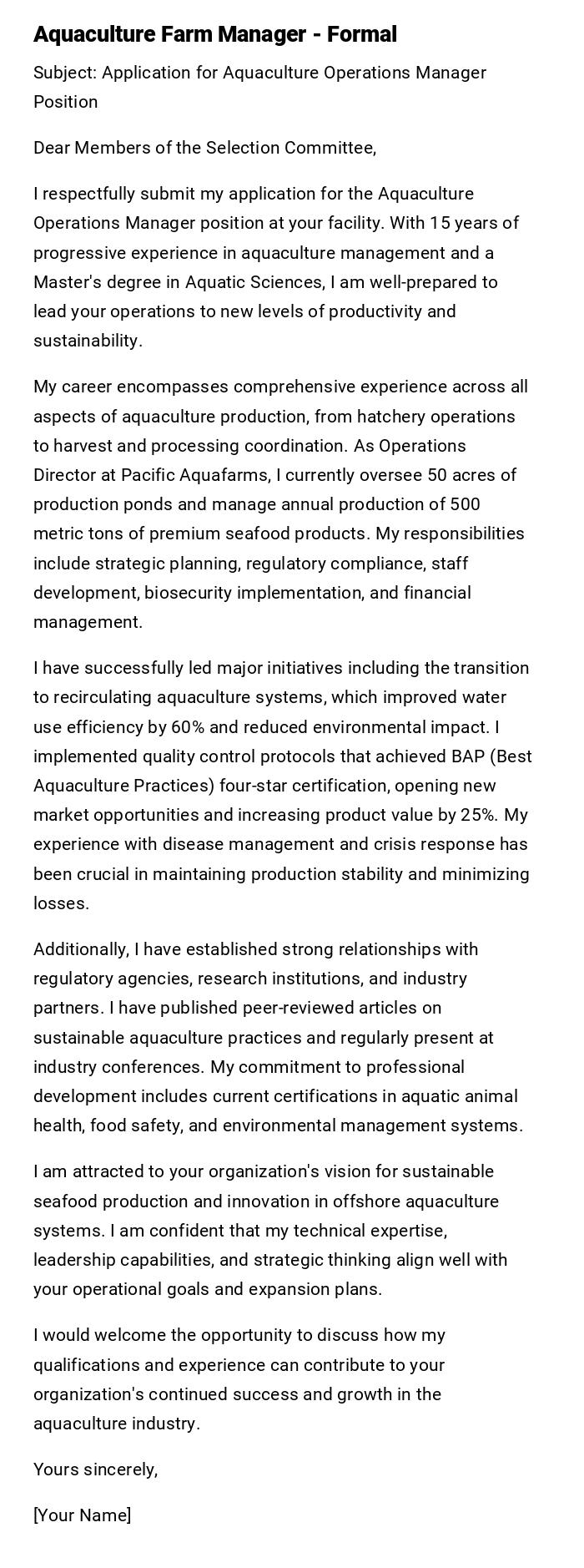
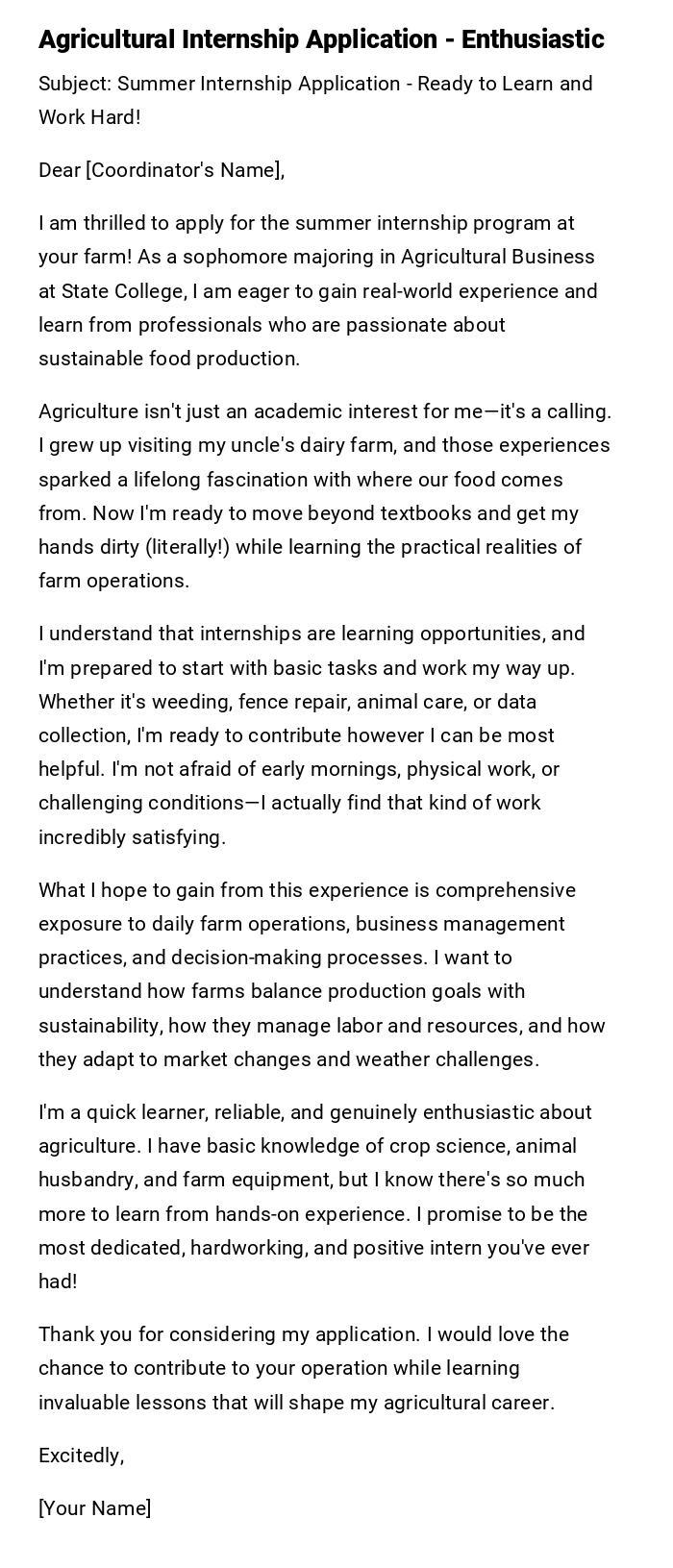

 Download Word Doc
Download Word Doc
 Download PDF
Download PDF